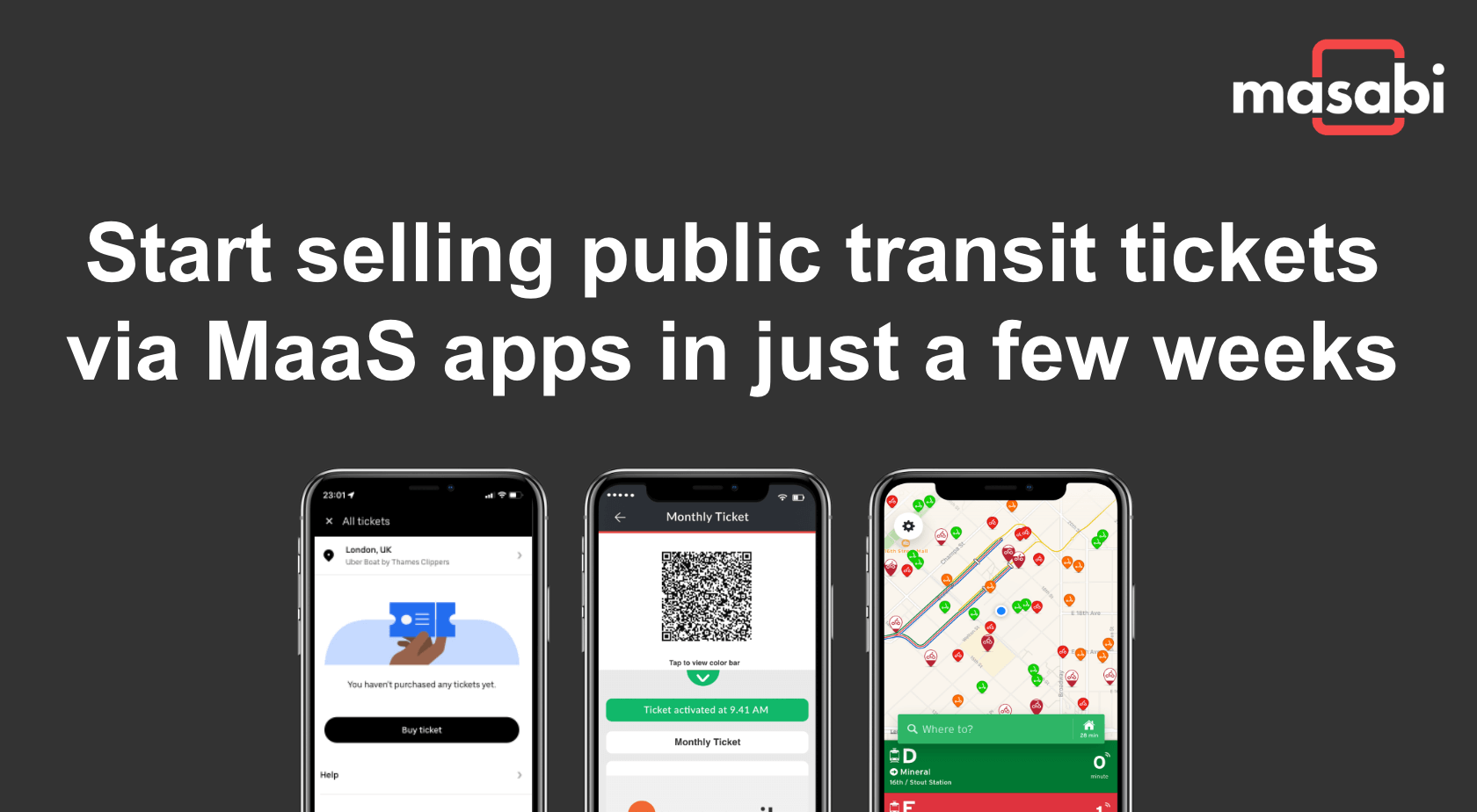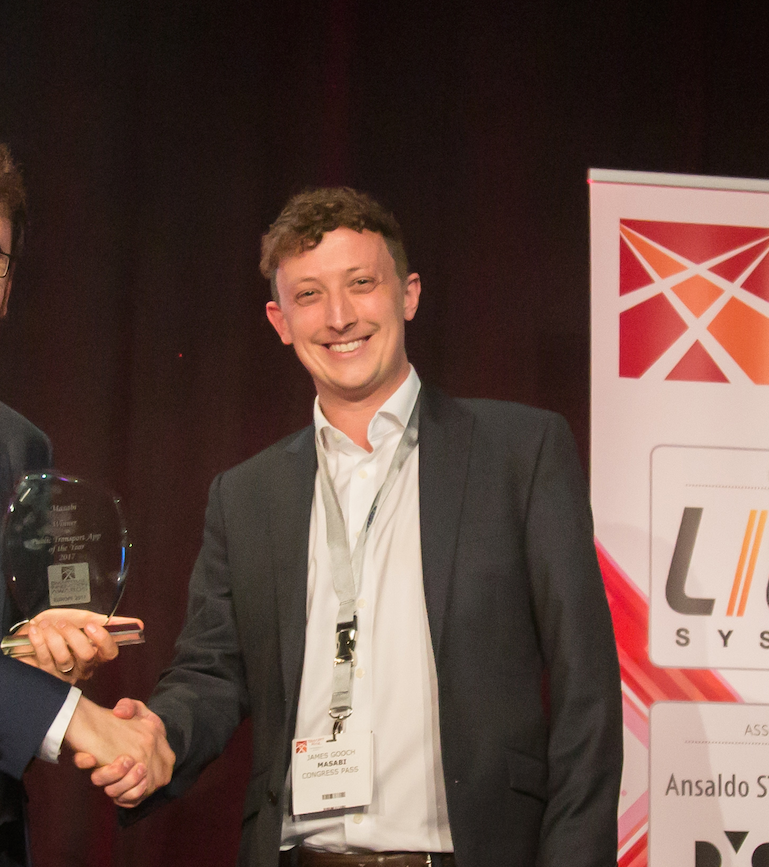One of the advantages of Mobility as a Service (MaaS) is the ability to reach a whole new audience of potential customers who are already using mobility solutions via apps like Uber, Transit or Moovit.
Making public transit tickets available to purchase in MaaS apps with large existing user bases, significantly increases the awareness and discoverability of public transit options and makes buying and paying for tickets more convenient for riders, without needing to sign up to MaaS subscriptions.
And the good news is that transit agencies wanting to sell public transit tickets through the most popular MaaS platforms can be up and running in a matter of weeks.
Takeouts:
- Over 50 transit agencies are already selling tickets via MaaS apps
- 4 agencies in Canada have adopted ticketing in leading mobility apps
- No development costs with simple usage-based pricing
- Ready for rollout in weeks (subject to contracting)
- Deliver tickets in apps riders already choose and use with large existing user bases
Adding MaaS platforms as additional sales channels may seem like a risky and potentially costly project, but more than 50 transit agencies around the world are already selling tickets via rapidly growing MaaS apps such as Uber, Transit, Moovit, Google Maps and Citymapper.
Making public transit tickets available via these increasingly popular apps with large and growing user bases is a rapid and cost-effective way for transit agencies to expand and diversify ticketing sales channels by partnering with MaaS apps that are already being used by millions of people around the world.
We call this results-driven approach ‘Practical MaaS’ and public transit agencies can adopt it quickly.
Practical MaaS is all about integrating the ability to purchase transit tickets within popular consumer-facing MaaS apps – connecting public transit with private sector mobility solutions such as ride-hailing or bike-sharing to help solve the first and last mile problem and deliver riders a seamless journey.
Masabi’s Justride Software Development Kit (SDK) integrates public transit with the rapidly expanding MaaS ecosystem, empowering mobility app users to plan seamless end-to-end journeys using the powerful journey-planning functionality embedded within these apps.
The SDK is pre-integrated into leading MaaS apps and allows agencies to quickly ‘plug into’ these solutions and start selling tickets.
From Cincinnati to Las Vegas to London, transit agencies and transport operators have successfully launched their own digital ticketing operations within market-leading MaaS apps by using the Justride SDK.
Consumer research suggests the vast majority of riders love the convenience of finding and purchasing transit tickets with just a couple of taps on their phone and many transit agencies have seen an increase in ticket sales as a result.
Deploying practical MaaS offers a ‘win-win’ smart ticketing solution because agencies only pay for tickets sold, so even if you only attract a small number of additional riders to use public transit, the benefits far outweigh the costs.
For agencies who aren’t currently prioritising selling tickets through consumer-facing MaaS platforms, the SDK can also be integrated into agency-branded MaaS apps.
Where in the world has a Practical Mobility-as-a-Service (MaaS) approach been used?
The beauty of Practical MaaS is that it exists in the here and now. Some transit agencies have been able to deploy Practical MaaS ticket sales in a matter of weeks. Rather than designing and building elaborate ticketing systems and applications from scratch, Justride’s open platform is designed to easily integrate with MaaS apps.
Practical MaaS in Canada
Transit launched in-app ticketing for public transit in Canada during 2019 for riders in St Catharines, allowing them to buy tickets and ride public transport using the Transit (app), while also combining public transit with Transit’s other private mobility services. After just over 4 weeks mobile ticketing adoption using the SDK was over 7%.
Transit and Masabi also launched Montreal’s first mobile fare solution for ARTM covering all Montreal-area buses in September 2020. Saskatoon Transit also launched mobile ticketing with Transit in 2021 alongside an agency-branded mobile application.
You can now also buy tickets using the Transit app for people riding in Calgary.
Practical MaaS in the USA
The Justride SDK has been adopted by Uber to deliver ticketing for public transit for riders of RTD services in Denver. The launch of Uber Transit ticketing, which completed its roll out at the end of May 2019, saw more than 14,500 tickets sold through Uber by the end of September. RTD went on to deploy ticketing in the Transit app, meaning more people already using urban mobility applications can now easily access and discover RTD services. These new rider capabilities were launched alongside the existing agency mobile ticketing application (also provided by Masabi), which has continued to see a rise in adoption since the two SDK launches. In December 2020 tickets were also enabled in Lyft for RTD services, expanding the app retail network further and making it easy for Lyft users to discover, purchase and use RTD tickets.
A similar offering went live in Las Vegas in January 2020 with the launch of ticketing in both the Uber and Transit applications, operating alongside the existing agency-branded app. Lyft also enabled mobile fares in 2021.
The next 14 agencies to deploy a branded mobile ticketing application and Practical MaaS using Transit were; Laketran (Lake County), MCPT (Medina County), METRO RTA (Summit County), PARTA (Portage County), Sandusky Transit (Erie County), SARTA (Stark County), TARTA (Lucas County), WRTA (Mahoning County), BCRTA (Butler County), SORTA (Hamilton County), TANK (Northern Kentucky), The Ride and The Lancaster-Fairfield Transit systems. The EZfare service (enabled through NEOride) went fully live in October 2019 and has since sold thousands of tickets and expanded to include the option to buy tickets in Uber and Moovit.
Ticketing in Transit has been extremely successful and has also been deployed with agencies in St Louis, Dayton, Duluth, Rochester and Pittsburgh.
From November 2020 transit riders using San Joaquin RTD, Manteca Transit, Tracer, eTrans, Altamont Corridor Express (ACE Rail), GrapeLine and City of Ripon transit services have been able to use the Vamos Mobility app to plan their journeys and, thanks to the addition of ticketing via the Justride SDK, purchase tickets for any of the seven participating transit systems. The project was made possible through SJCoG bringing together a regional practical MaaS solution with Kyyti and Masabi.
Academy Bus launched the white label SilverPass mobile app in January 20201 to make trip planning and paying easier and safer for riders during the COVID-19 pandemic and beyond with Moovit and Masabi. This followed in 2021 with a launch for Suffolk Transit.
Fire Island Ferry riders can now purchase tickets directly in the Uber app following a successful launch in 2021.
Practical MaaS in Europe
In Europe, Uber Boat by Thames Clippers launched in 2020 with tickets in the Uber app. In Bilbao, Spain, Lurraldebus teamed up with local provider Gertek to launch an agency-branded MaaS app and a few weeks ago Uber also launched with National Express West Midlands.
In all of these examples, the main factors that convinced transit authorities to embrace Practical Maas included:
- Low cost: Usage-based pricing reduces cost and risk
- Speed: Can be rolled out in a matter of weeks rather than months or years
- Discoverability: Makes it easier for passengers to find and book tickets in apps they already choose and use
In total, some 50 transit agencies around the world are now operating some form of Practical MaaS, with many more currently preparing to launch.
To find out more about how Masabi can help your agency deliver a practical MaaS solution within weeks, get in touch: contact@masabi.com


